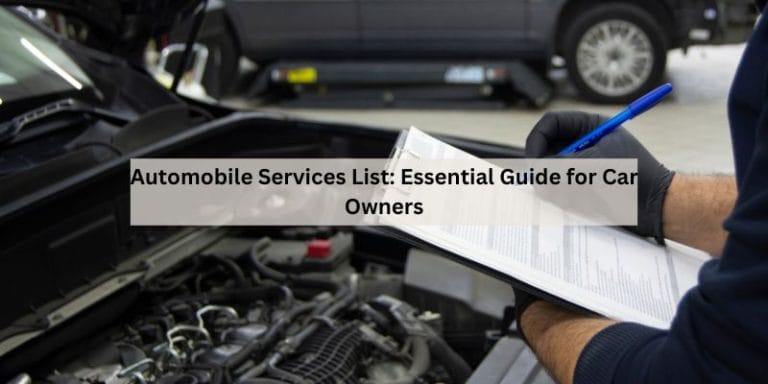Pros And Cons of Vehicles: A Comprehensive Overview
Vehicles have pros and cons. They provide convenience and independence in transportation, but also come with financial costs, maintenance requirements, and environmental concerns.
Parking and storage challenges can also be drawbacks for car owners. Additionally, maintaining registration and finding parking spots can be inconvenient. On the positive side, cars offer personal freedom and the ability to go wherever and whenever you want. Buying a vehicle allows you to build equity in a valuable asset, with no mileage limits or wear-and-tear charges.
However, used cars may have limited choices, less reliability, hidden problems, and higher maintenance costs. Overall, owning a car has its advantages and disadvantages that need to be considered.
Introduction To Vehicle Ownership
Owning a vehicle offers convenience and independence in transportation. It allows you to travel at your own pace and on your own schedule. However, the financial costs of purchasing and maintaining a vehicle can be significant. Apart from the initial purchase price, there are ongoing expenses such as fuel, insurance, and repairs that can add up over time. Additionally, vehicles contribute to environmental concerns due to emissions and fuel consumption. Parking and storage can also be challenging, especially in urban areas with limited space. Despite these drawbacks, vehicle ownership provides unparalleled freedom and flexibility in getting around.
Financial Implications
The financial implications of owning a vehicle can have both positive and negative aspects. The initial costs of purchasing a vehicle can be significant, especially when considering financing options. However, owning a vehicle also brings the convenience of transportation. On the other hand, running and maintenance expenses can add up over time. While owning a vehicle provides independence, it’s essential to consider the long-term financial commitment and the impact on your budget.
Convenience And Independence
When it comes to vehicles, it’s important to consider the Pros And Cons. Owning a car provides convenience and independence for travel. It allows for ease of travel and has a significant impact on lifestyle. However, there are also financial costs, maintenance requirements, and environmental concerns associated with car ownership. Additionally, parking and storage challenges can pose difficulties for car owners. On the other hand, cars offer personal freedom, no mileage limits, and the ability to sell or trade the vehicle. Used cars may have lower insurance premiums and are an environmentally friendly option, but they may also come with limited choices, less reliability, and higher maintenance costs. SUVs excel in providing spaciousness, off-road capability, and towing capacity, but they also have drawbacks in terms of fuel consumption. It’s important to weigh the pros and cons when considering vehicle ownership.
Environmental Considerations
Vehicles offer convenience and independence in transportation, but they also come with financial costs, maintenance requirements, and environmental concerns. Ownership brings personal freedom, but also parking and storage challenges, while used cars may offer lower costs and environmental friendliness, but with potential reliability and maintenance issues.
| Emissions and Pollution |
| One of the biggest environmental concerns associated with vehicles is the emissions they produce. Cars emit pollutants that contribute to air pollution, which can have harmful effects on human health and the environment. The pollutants released by cars include carbon monoxide, nitrogen oxides, and particulate matter. Hybrid and electric vehicles produce fewer emissions than traditional gasoline-powered vehicles, making them a more environmentally friendly option. |
| Fuel Efficiency and Alternatives |
| Fuel efficiency is another important environmental consideration when it comes to vehicles. More fuel-efficient vehicles consume less gasoline and produce fewer emissions, making them a better choice for the environment. In addition to fuel-efficient vehicles, there are also alternative fuel options available, such as hybrid and electric vehicles, that produce fewer emissions and have a smaller environmental impact. However, the production and disposal of batteries for electric vehicles can also have negative environmental effects. |
Safety And Technological Advancements
Safety and technological advancements in vehicles have both pros and cons. On one hand, advancements in safety features like airbags and collision avoidance systems have made vehicles safer than ever before. On the other hand, the increasing reliance on technology in vehicles can also lead to distractions and potential malfunctions.
It is important for drivers to be aware of both the benefits and drawbacks of these advancements to make informed decisions on the road.
| Modern Safety Features: | With the advancements in technology, modern vehicles come equipped with various safety features such as lane departure warning, blind spot monitoring, automatic emergency braking, and adaptive cruise control. These features can greatly reduce the risk of accidents and provide a safer driving experience. |
| The Rise of Autonomous Vehicles: | Autonomous vehicles are the future of transportation and are designed to eliminate the need for human drivers. They come equipped with advanced technology such as lidar, radar, and cameras to provide a safe and efficient driving experience. However, there are still concerns about the safety and reliability of autonomous vehicles, and the need for infrastructure to support them. |
The safety and technological advancements in vehicles have brought about many pros and cons. Modern safety features like lane departure warning and automatic emergency braking have greatly reduced the risk of accidents. Autonomous vehicles are the future of transportation and can provide a safer and efficient driving experience. However, there are still concerns about the reliability of autonomous vehicles and the need for infrastructure to support them. It is important to weigh the pros and cons before making a decision about the type of vehicle to own.
Resale Value And Ownership
Resale value and ownership of vehicles have their pros and cons. On the positive side, owning a car provides convenience and independence in transportation. However, it also comes with financial costs, maintenance requirements, and environmental concerns. Additionally, parking and storage challenges can pose difficulties for car owners.
| Depreciation Factors |
| One of the biggest cons of owning a vehicle is its depreciation value. As soon as you drive a new car off the dealership lot, its value depreciates significantly. Other factors that can affect the resale value of your vehicle include the make and model, mileage, condition, and the level of wear and tear. Additionally, if you have financed your car and still owe money on it, you may find yourself upside down on your loan, meaning you owe more than the car is worth. |
| Selling and Trading |
| On the other hand, owning a car can also have its pros when it comes to selling or trading it in. If you have taken good care of your vehicle and kept it in good condition, you may be able to sell it for a higher price or trade it in for a new car. You can also negotiate the price of the car and get a better deal when selling or trading it in. |
Insurance And Legalities
Vehicles come with both advantages and disadvantages. On the positive side, they provide convenience and independence in transportation. However, owning a car also involves financial costs, maintenance requirements, and environmental concerns. Additionally, parking and storage can be challenging for car owners.
| Insurance Costs | Legal Requirements |
|---|---|
| When it comes to owning a vehicle, insurance costs can be a major factor to consider. The cost of insurance can vary depending on factors such as your driving record, age, location, and the type of vehicle you own. While it is important to have insurance to protect yourself and others in the event of an accident, it can also add up to a significant expense. | Legal requirements for owning a vehicle vary depending on the state or country you live in. Generally, you are required to have a valid driver’s license, registration, and insurance to legally operate a vehicle. Some states also require additional inspections or emissions testing. It is important to research and understand the legal requirements in your area to avoid any penalties or fines. |
In summary, owning a vehicle comes with both advantages and disadvantages. While it provides convenience and independence, it also comes with financial costs, maintenance requirements, and environmental concerns. Insurance costs and legal requirements are important factors to consider when owning a vehicle.
Lifestyle And Societal Impact
When it comes to the lifestyle and societal impact of vehicles, it’s important to consider the social status and perception they bring. Owning a vehicle can often be seen as a symbol of success and independence, influencing how individuals are perceived within their communities. However, this can also lead to disparities in access to transportation, particularly in urban areas where urban planning and infrastructure may not adequately support diverse mobility needs. While vehicles offer convenience, they also contribute to congestion and environmental concerns, highlighting the need for sustainable transportation solutions.
Future Of Vehicles
In the future of vehicles, the electric and hybrid trends are gaining momentum. The shift towards eco-friendly transportation is driven by policy and innovation. Governments are encouraging the adoption of electric and hybrid vehicles through incentives and regulations. Innovations in battery technology and charging infrastructure are addressing the limitations of electric vehicles, making them more viable for everyday use. However, the transition to electric and hybrid vehicles also poses challenges such as the reliance on rare earth materials for batteries and the need for extensive charging infrastructure. Despite these challenges, the future of vehicles is undoubtedly moving towards sustainable and efficient transportation options.
Frequently Asked Questions
What Are The Pros And Cons Of Having A Car?
Having a car has its pros and cons. It offers convenience and independence in transportation, but comes with financial costs, maintenance requirements, and environmental concerns. Parking and storage can also be challenging. Additionally, owning a car may lead to being asked for frequent rides.
Overall, it provides personal freedom, but has its drawbacks.
What Are The Positives And Negatives Of Cars?
Cars offer convenience and independence in transportation, allowing you to go wherever you want, whenever you want. However, there are drawbacks such as financial costs, maintenance requirements, and environmental concerns. Finding parking and dealing with storage challenges can also be inconvenient.
Additionally, owning a car may lead to frequent requests for rides from friends.
What Are The Pros Of Buying A Vehicle?
Buying a vehicle has several advantages. It allows you to build equity in a valuable asset and provides convenience and independence in transportation. There are no mileage limits or wear-and-tear charges, and you have the ability to sell or trade in the vehicle.
However, there are also financial costs, maintenance requirements, and environmental concerns to consider.
What Are Some Pros And Cons Of A Used Car?
Pros of a used car: Lower cost, lower insurance, more choices within budget, lower registration fees, and environmentally friendly. Cons of a used car: Limited choices, less reliability, lack of warranty, hidden problems, and higher maintenance costs.
Conclusion
Owning a vehicle has its advantages and disadvantages. On one hand, vehicles provide convenience and independence in transportation. They offer personal freedom and the ability to go wherever and whenever you want. On the other hand, there are financial costs, maintenance requirements, and environmental concerns associated with owning a vehicle.
Additionally, finding parking and storage can be challenging. It’s important to weigh the pros and cons before deciding to own a vehicle.







